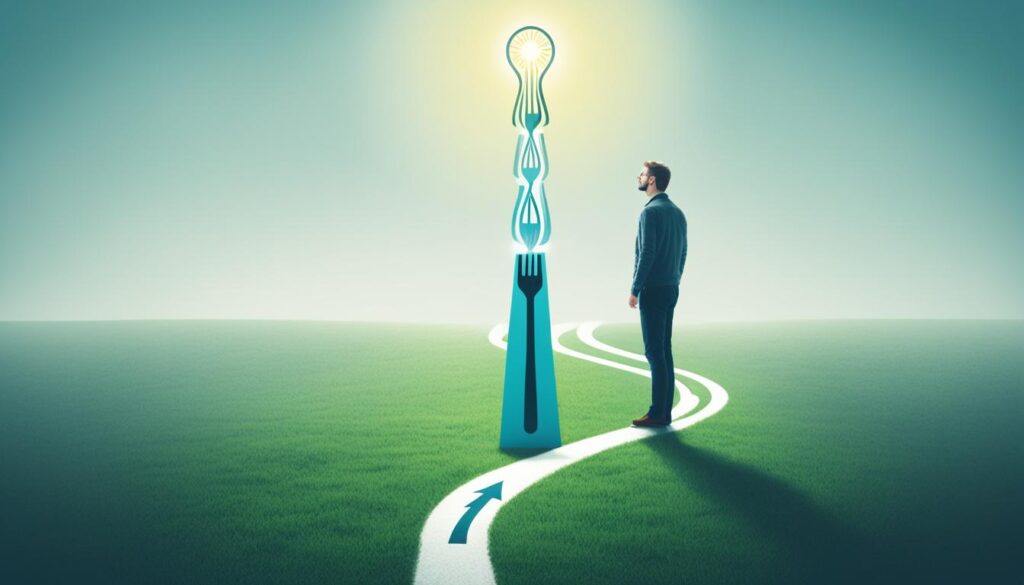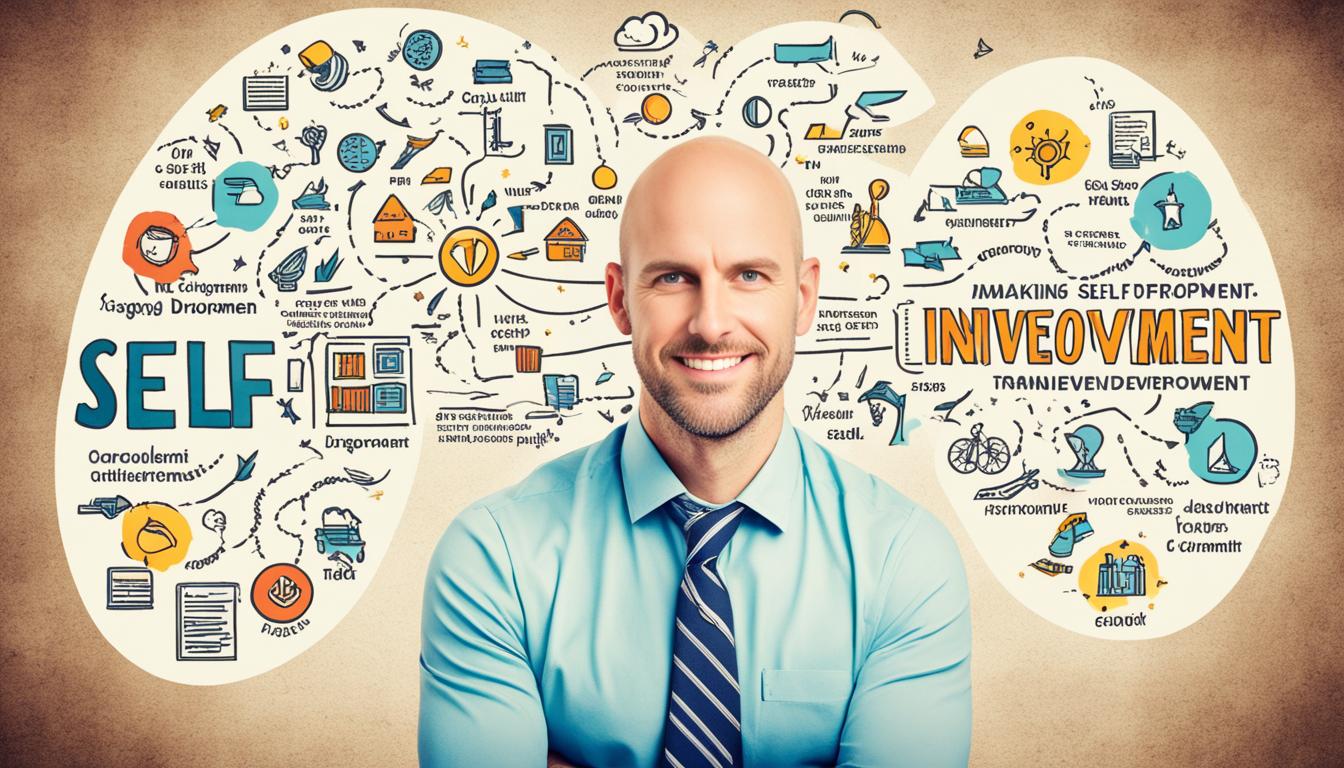Self improvement and self development are two terms often used interchangeably, but they have distinct differences. While self improvement focuses on making specific changes to improve oneself in various aspects of life, self development is a broader concept that encompasses personal growth, self-awareness, and continuous improvement. Both self improvement and self development involve activities and practices aimed at enhancing one’s well-being and achieving a fulfilling life.
Key Takeaways:
- Self improvement focuses on specific changes to improve oneself.
- Self development encompasses personal growth and continuous improvement.
- Both approaches aim to enhance well-being and achieve a fulfilling life.
- Self improvement involves setting specific goals for improvement.
- Self development emphasizes holistic growth and self-awareness.
Understanding Self Improvement
Self improvement is a conscious effort that individuals undertake to enhance their skills, knowledge, habits, and overall quality of life. It involves setting specific goals, identifying areas for improvement, and taking actionable steps to make positive changes. The process of self improvement encompasses various aspects such as personal growth, career advancement, physical and mental well-being, relationships, and more.
To embark on a journey of self improvement, it is essential to have a mindset shift that embraces the idea of continuous learning and growth. This mindset allows individuals to overcome obstacles, seek new opportunities, and adapt to changing circumstances. Self improvement requires a willingness to learn from mistakes, explore new possibilities, and challenge oneself to reach new heights.
Goal setting plays a vital role in self improvement. By setting clear and achievable goals, individuals can create a roadmap for their personal growth. These goals provide motivation and direction, guiding individuals towards the actions and behaviors that will lead to self betterment.
“The only limit to your self improvement is yourself.”
Self improvement is not a linear process, and it requires patience, dedication, and consistency. It involves breaking old patterns, adopting new habits, and embracing change. Continuous improvement is a fundamental principle of self improvement, as it encourages individuals to continuously reflect on their progress, adapt their strategies, and course-correct when necessary.
Benefits of Self Improvement
The pursuit of self improvement offers numerous benefits. By actively working on self betterment, individuals can experience personal growth, increased self-confidence, expanded knowledge and skills, improved relationships, and a greater sense of fulfillment. Self improvement enables individuals to unlock their full potential, enhance their overall well-being, and live a more purposeful life.
The table below highlights some of the key benefits of self improvement:
| Benefits of Self Improvement |
|---|
| 1. Personal growth and self-awareness |
| 2. Increased self-confidence and self-esteem |
| 3. Improved mental and emotional well-being |
| 4. Better decision-making abilities |
| 5. Enhanced leadership and communication skills |
| 6. Increased productivity and effectiveness |
| 7. More fulfilling relationships |
| 8. Better adaptability and resilience |
Exploring Self Development
Self development is a journey of continuous growth and self-improvement. It goes beyond setting specific goals and delves into the broader aspects of personal growth, self-empowerment, and continuous improvement. Self development encompasses all areas of life, including relationships, career, spirituality, and emotional well-being.
At its core, self development involves the ongoing process of self-discovery and self-awareness. It prompts individuals to explore their values, beliefs, and purpose, guiding them towards a more fulfilling and meaningful life. Through self development, one can cultivate a deeper understanding of oneself and develop a strong sense of identity.
This journey of self development is a transformative experience. It requires continuous learning, reflection, and improvement. It entails exploring new experiences, acquiring new skills, and expanding one’s horizons. The process allows individuals to tap into their potential and uncover hidden talents.
Self development encourages individuals to embrace growth, both personally and professionally. It fosters resilience, adaptability, and a positive mindset, enabling individuals to overcome challenges and setbacks. By continuously striving for self improvement, individuals can create positive changes in their lives and become the best versions of themselves.
Throughout the self development journey, there are valuable resources and tools that can aid in personal growth. These can include self-help books, online courses, workshops, and mentorship programs. Seeking guidance and support from others who have traveled similar paths can provide valuable insights and inspiration.
“The only person you are destined to become is the person you decide to be.” – Ralph Waldo Emerson
Achieving self-empowerment and personal growth through self development requires a commitment to continuous learning and improvement. It involves stepping outside of one’s comfort zone, embracing change, and challenging limiting beliefs.
By embarking on the journey of self development, individuals can unlock their true potential, cultivate self-empowerment, and live a life of continuous growth and fulfillment.

Key Differences Between Self Improvement And Self Development
When it comes to personal growth, self improvement and self development are often used interchangeably. However, there are distinct differences between the two concepts that are important to understand. Self improvement focuses on specific areas of improvement and goal attainment, while self development takes a broader approach, encompassing the overall growth and development of an individual.
Self improvement is more specific and goal-oriented, targeting particular aspects of one’s life that they want to improve. It involves setting clear objectives, identifying areas for growth, and taking actionable steps to achieve those goals. Self improvement often involves measurable outcomes and short-term achievements that can be measured along the way. It aims to enhance specific skills, habits, or knowledge in order to lead a more fulfilling life.
Self development, on the other hand, takes a more holistic approach to personal growth. It focuses on the continuous and ongoing development of an individual in all aspects of their life – physical, mental, emotional, and spiritual. Self development involves a deeper exploration and understanding of oneself, cultivating self-awareness, and nurturing a sense of purpose and authenticity. It goes beyond specific goals and involves a lifelong journey of continuous learning, self-discovery, and self-empowerment.
Self improvement is like sharpening specific tools in your toolbox, while self development is like expanding and upgrading the entire toolbox.
The mindset and strategies used in self improvement and self development also differ. Self improvement often involves a more structured and goal-focused mindset, with specific action plans and measurable outcomes. Self development, on the other hand, requires a more open and flexible mindset, embracing uncertainty and allowing for ongoing growth and transformation. It emphasizes self-reflection, self-awareness, and a willingness to explore new experiences and perspectives.
Both self improvement and self development are valuable for personal growth and well-being. Self improvement allows individuals to make targeted changes in specific areas of their life, while self development provides a broader framework for overall growth and self-empowerment. The choice between self improvement and self development ultimately depends on individual goals, preferences, and the level of depth desired in personal growth. It’s important to find a balance between both approaches to create a comprehensive strategy for personal development.
Strategies for Self Improvement
When it comes to self improvement, there are various strategies and techniques that can help individuals enhance their personal growth and well-being. By implementing these self improvement strategies, you can take small steps towards becoming the best version of yourself and achieving your goals.
Setting Clear Goals
One of the key self improvement techniques is setting clear and specific goals. By defining what you want to achieve, you can create a roadmap for your personal development journey. Make sure your goals are realistic, measurable, and aligned with your values and aspirations.
Creating Action Plans
An action plan is a powerful tool for self improvement. Break down your goals into smaller, manageable tasks and create a step-by-step plan to guide your progress. Having a clear plan of action will help you stay focused and motivated.
Developing Positive Habits
Habits play a significant role in our lives and can either support or hinder our self improvement efforts. Identify habits that are holding you back and replace them with positive ones. Start small and gradually incorporate new habits into your daily routine.
Practicing Self-Reflection and Self-Awareness
Self-reflection and self-awareness are essential for personal growth. Take time to reflect on your thoughts, emotions, and behaviors. Journaling, meditation, and mindfulness practices can help you develop a deeper understanding of yourself and your areas for improvement.
“Self-reflection is the school of wisdom.”
– Baltasar Gracian
Seeking Feedback from Others
Feedback from others is invaluable for self improvement. Seek constructive feedback from trusted friends, mentors, or coaches. Their different perspectives can provide insights and help you gain new perspectives on your strengths and areas for growth.
Continuous Learning
Self improvement never stops, and continuous learning is a fundamental strategy for personal growth. Engage in lifelong learning through reading books, attending seminars, taking online courses, or joining professional development programs. Embrace new knowledge and skills to expand your horizons.
Seeking Support from Mentors or Coaches
Seeking support from mentors or coaches can significantly accelerate your self improvement journey. These individuals can provide guidance, accountability, and support as you work towards your goals. They can offer valuable insights and expertise to help you overcome challenges and reach your full potential.
By incorporating these self improvement strategies into your life, you can embark on a transformative journey of personal growth and self-discovery.

| Self Improvement Strategies | Benefits |
|---|---|
| Setting Clear Goals | Provides direction and focus |
| Creating Action Plans | Enhances productivity and accountability |
| Developing Positive Habits | Improves overall well-being and success |
| Practicing Self-Reflection and Self-Awareness | Fosters personal growth and self-awareness |
| Seeking Feedback from Others | Provides valuable insights and alternative perspectives |
| Continuous Learning | Expands knowledge and skills |
| Seeking Support from Mentors or Coaches | Accelerates personal growth and development |
Approaches to Self Development
Self development can be approached in different ways, depending on individual preferences and needs. Here are some common approaches to self development:
- Practicing Self-Care: Taking care of oneself physically, mentally, and emotionally is essential for personal growth. This can involve activities such as exercise, getting enough sleep, eating nutritious food, and engaging in hobbies or activities that bring joy and relaxation.
- Engaging in Activities That Promote Personal Growth and Well-being: Actively seeking out opportunities for personal growth can include reading self-help books, attending workshops or seminars, joining a support group, or enrolling in courses that align with your interests and goals.
- Cultivating Self-Awareness Through Mindfulness and Meditation: Practicing mindfulness and meditation can help foster self-awareness, reduce stress, and improve overall well-being. Taking time to observe and understand one’s thoughts and emotions can lead to greater clarity and self-discovery.
- Exploring New Experiences and Learning Opportunities: Stepping out of your comfort zone and trying new things can be a powerful way to foster personal growth. This can involve traveling to new places, learning a new skill or hobby, or challenging yourself to overcome fears or limitations.
- Investing in Relationships and Community Involvement: Building meaningful connections with others and engaging in community activities can contribute to personal growth and a sense of belonging. This can involve volunteering, joining groups or clubs, or nurturing relationships with friends, family, and mentors.
- Embracing a Growth Mindset: Adopting a growth mindset involves believing in one’s ability to learn and grow, even in the face of challenges or setbacks. It requires embracing a positive outlook, seeing failures as opportunities for growth, and being open to continuous learning and improvement.
Self development is a continuous process that requires ongoing commitment and an open mindset. By embracing these approaches, individuals can embark on a transformative journey of personal growth and self-discovery.
Integrating Self Improvement and Self Development
While self improvement and self development have their distinct focuses, they are not mutually exclusive. In fact, they complement each other and can be integrated for holistic personal growth. Self improvement provides specific strategies and goals to work on, while self development offers a broader framework for continuous learning and growth. By combining both approaches, individuals can create a balanced approach to personal development, addressing specific areas for improvement while also fostering overall well-being and self-awareness.
Self improvement focuses on targeted areas for improvement, such as developing new skills, improving habits, or achieving specific goals. It involves setting actionable steps and measurable objectives to make tangible progress. By actively working on self improvement, individuals can create positive changes in specific areas of their lives and enhance their overall well-being.
On the other hand, self development takes a more holistic approach, encompassing all aspects of an individual’s life. It involves cultivating self-awareness, exploring personal values, beliefs, and purpose, and nurturing personal growth across various domains. Self development encourages continuous learning, reflection, and personal transformation.
“Self improvement without self development is like a sprint without a finish line, while self development without self improvement is like wandering without a map.”
The integration of self improvement and self development allows individuals to harness the benefits of both approaches. By setting specific goals and working on targeted areas for self improvement, individuals can enhance their skills, build healthy habits, and achieve short-term objectives. At the same time, engaging in self development practices supports a broader and deeper personal growth journey. It involves developing self-awareness, understanding one’s values, beliefs, and purpose, and fostering overall well-being.

| Self Improvement | Self Development |
|---|---|
| Focused on specific areas for improvement | Embraces holistic personal growth |
| Targets measurable goals and outcomes | Encourages continuous learning and reflection |
| Enhances skills, habits, and specific aspects of life | Cultivates self-awareness, values, beliefs, and purpose |
| Achieves short-term objectives | Fosters long-term personal transformation |
By integrating self improvement and self development, individuals can create a comprehensive approach to personal growth. They can focus on specific areas for improvement while also nurturing their overall well-being and self-awareness. This integration allows individuals to set meaningful goals, take actionable steps, and continuously learn and grow on their journey of self-discovery and self-improvement.
Benefits of Integrating Self Improvement and Self Development
Integrating self improvement and self development offers numerous benefits for personal growth:
- Enhanced self-awareness and self-reflection
- Improved personal well-being and happiness
- Expanded skills and knowledge
- Aligned values, beliefs, and purpose
- Greater resilience and adaptability
- Meaningful goal setting and achievement
- Positive mindset and self-confidence
- Deeper sense of fulfillment and satisfaction
The integration of self improvement and self development allows individuals to embark on a transformative personal growth journey that encompasses both targeted improvement and holistic well-being. By combining these approaches, individuals can unlock their full potential, achieve personal fulfillment, and lead a meaningful life.
Benefits of Self Improvement and Self Development
Engaging in self improvement and self development practices offers a wide range of benefits that contribute to personal growth and well-being. By actively working on improving oneself and embracing continuous development, individuals can unlock their full potential and lead a more fulfilling life.
“The only person you should try to be better than is the person you were yesterday.”
Increased Self-Awareness
Self improvement and self development encourage individuals to delve deep into self-reflection, leading to increased self-awareness. By exploring their strengths, weaknesses, values, and beliefs, individuals gain a clearer understanding of who they are and what truly matters to them.
Enhanced Personal Growth and Well-being
Self improvement and self development provide individuals with the tools and strategies to foster personal growth and well-being. By actively working on improving various aspects of their lives, individuals can enhance their physical, mental, and emotional well-being, leading to a more balanced and fulfilling life.
Improved Relationships
Self improvement and self development also have a positive impact on relationships. As individuals grow and develop, they become more self-aware, empathetic, and understanding. This helps them build stronger connections, communicate effectively, and cultivate fulfilling relationships with others.
Increased Self-Confidence and Self-Worth
Engaging in self improvement and self development practices boosts self-confidence and self-worth. As individuals overcome challenges, set and achieve goals, and witness their personal growth, they develop a greater sense of confidence in their abilities and a stronger belief in their own worth.
Better Goal Setting and Achievement
Self improvement and self development provide individuals with the skills and mindset necessary for effective goal setting and achievement. By setting clear and meaningful goals, individuals can clarify their vision, stay focused, and work towards meaningful milestones, resulting in a sense of accomplishment and satisfaction.
Increased Resilience and Adaptability
Engaging in self improvement and self development practices cultivates resilience and adaptability. Individuals learn to embrace challenges, bounce back from setbacks, and adapt to changing circumstances. This enables them to navigate life’s ups and downs with greater ease and flexibility.
A More Positive Mindset
Self improvement and self development contribute to the development of a more positive and optimistic mindset. By shifting their perspective and focusing on personal growth and development, individuals can cultivate a mindset that is open to possibilities, resilient in the face of challenges, and grateful for the present moment.
By embracing self improvement and self development, individuals can reap these benefits and embark on a transformative journey of personal growth, self-discovery, and self-empowerment.
The Role of Self Improvement and Self Development in Personal Growth
Self improvement and self development play integral roles in personal growth and transformation. They provide individuals with the tools, mindset, and strategies to continuously improve themselves, explore new possibilities, and expand their capabilities.
By engaging in self improvement and self development practices, individuals can foster self-awareness, identify and overcome limiting beliefs, develop new skills and qualities, and ultimately unlock their full potential.
“The only person you are destined to become is the person you decide to be.” – Ralph Waldo Emerson
Self improvement focuses on specific areas for improvement, such as developing new habits, acquiring knowledge, or honing specific skills. It involves setting clear goals, creating action plans, and taking actionable steps to achieve them.
On the other hand, self development takes a broader approach, encompassing all aspects of life and emphasizing personal growth, self-empowerment, and continuous learning. It involves cultivating self-awareness, exploring new experiences, and nurturing holistic well-being.
The Difference Between Self Improvement and Self Development
To better understand the role of self improvement and self development in personal growth, let’s explore their differences:
| Self Improvement | Self Development |
|---|---|
| Focuses on specific areas for improvement | Takes a holistic approach to personal growth |
| Targets measurable goals and outcomes | Emphasizes continuous learning and exploration |
| Requires specific actions and strategies | Nurtures self-awareness and well-being |
| Often involves short-term changes | Is a lifelong journey without specific endpoints |
The table above illustrates the key differences between self improvement and self development. While both approaches contribute to personal growth, they differ in terms of scope, focus, and strategies.

Self improvement and self development create a symbiotic relationship in personal growth. Self improvement provides specific strategies and goals for individuals to work on, while self development offers a broader framework for continuous learning and exploration.
Combining both approaches allows individuals to address specific areas for improvement while fostering overall well-being, self-awareness, and personal transformation.
Through self improvement and self development, individuals can develop a growth mindset, cultivate resilience, and unleash their full potential in pursuit of a fulfilling and meaningful life.
Factors to Consider When Choosing Between Self Improvement and Self Development
The choice between self improvement and self development depends on individual preferences, goals, and needs. It’s crucial to consider several factors when making this decision to determine the most suitable approach for personal development.
Specific Areas for Improvement
Reflect on the specific areas of your life that you want to improve. Determine whether you have a particular skill, habit, or behavior that you want to change or enhance. Self improvement often focuses on targeted goals in specific aspects of life, such as career, relationships, or physical well-being.
Depth of Personal Growth
Consider the depth of personal growth you desire. Self improvement tends to emphasize measurable outcomes and short-term goals. On the other hand, self development takes a broader and more holistic approach, encouraging continuous learning, self-awareness, and self-empowerment.
Time and Resources Available
Evaluate the time and resources you have available for personal development. Self improvement often requires setting aside dedicated time for specific activities, such as attending workshops, taking courses, or practicing new skills. Self development, on the other hand, may involve a more flexible and continuous commitment to personal growth.
Current Stage of Life and Readiness for Change
Consider your current stage of life and readiness for change. Self improvement may be more suitable if you are looking to make specific changes and achieve tangible results in a relatively short period. Self development, on the other hand, can be a lifelong journey that requires ongoing commitment and self-reflection.
Personal Values, Interests, and Aspirations
Reflect on your personal values, interests, and aspirations. Consider which approach aligns better with your core values and resonates with your interests and long-term aspirations. This will help ensure that your chosen path of personal development is fulfilling and meaningful to you.
Seeking Support for Personal Growth
Embarking on a journey of personal growth through self improvement and self development requires guidance, accountability, and valuable perspectives. Thankfully, there are numerous resources and support systems available to individuals seeking to enhance their personal growth. These resources and support systems provide the necessary tools and assistance to navigate the challenges and complexities that arise along the way.
One of the most accessible and valuable resources is books. Books on self improvement and self development offer a wealth of knowledge, insights, and practical strategies to support personal growth. They provide valuable perspectives from experts in the field, offering guidance on various aspects of personal development, from mindset shifts to goal setting and beyond.
Online courses and workshops are another valuable avenue for personal growth support. They offer structured learning experiences tailored to specific topics or areas of interest. These courses and workshops provide a platform for acquiring new skills, gaining deeper insights, and connecting with like-minded individuals on a similar personal growth journey.
For those seeking a more interactive and communal approach, support groups can be an invaluable resource. Support groups provide a safe and nurturing environment where individuals can share experiences, challenges, and successes. They offer peer-to-peer support, fostering camaraderie and connection, and provide a space to learn from others facing similar personal growth challenges.
Mentors and coaches are another excellent resource for personal growth support. These experienced individuals provide guidance, wisdom, and accountability on the personal growth journey. They offer valuable insights, help identify blind spots, and provide tailored strategies and feedback to accelerate personal growth and achieve desired outcomes.
| Resources for Personal Growth Support |
|---|
| Books |
| Online Courses and Workshops |
| Support Groups |
| Mentors and Coaches |
For individuals who require more specialized support, therapy can play a pivotal role in personal growth. Therapists provide a safe and non-judgmental space to explore inner thoughts, emotions, and patterns of behavior. They guide individuals in developing healthier coping mechanisms and provide tools to address deep-rooted issues that may be hindering personal growth.
When seeking personal growth support, it’s essential to select resources and support systems that align with individual goals and values. Each person’s journey is unique, and it’s important to find a personalized approach that resonates and supports one’s specific needs. By tapping into these resources and support systems, individuals can gain the necessary tools, insights, and encouragement to facilitate their personal growth and transformation.
Mindset Shift for Personal Growth
Developing a growth mindset is crucial for personal growth and transformation. A growth mindset involves embracing challenges, viewing failure as an opportunity to learn, being open to new experiences and perspectives, seeking feedback, and believing in the potential for growth and development.
Cultivating a positive and resilient mindset can empower individuals to overcome obstacles, take risks, and pursue continuous personal growth and improvement. By shifting their mindset towards one of growth and possibility, individuals can unlock their full potential and create meaningful change in their lives.
“The only limits you have are the limits you believe.” – Wayne Dyer
Embracing challenges is an essential aspect of a growth mindset. Instead of avoiding difficulties, individuals with a growth mindset see challenges as opportunities for growth and learning. They understand that setbacks and failures are part of the learning process and use them as stepping stones to improve and achieve their goals.
Being open to new experiences and perspectives is another key characteristic of a growth mindset. Individuals with a growth mindset are curious and eager to explore different ideas, viewpoints, and possibilities. They understand that there is always room for growth and are willing to step out of their comfort zone to expand their horizons.
Seeking feedback is crucial for personal growth and development. Individuals with a growth mindset actively seek feedback from others to gain valuable insights and perspectives. They see feedback as a tool for improvement and welcome constructive criticism as an opportunity to learn and grow.
Benefits of a Growth Mindset
A growth mindset has numerous benefits for personal growth and development:
- Increased resilience and perseverance in the face of challenges
- Improved problem-solving and creative thinking skills
- Enhanced motivation and drive to achieve goals
- Greater self-confidence and self-belief
- Improved relationships and communication skills
By adopting a growth mindset, individuals can foster a positive and proactive approach to personal growth. They become more resilient, adaptable, and open-minded, enabling them to navigate the ups and downs of life with greater ease and achieve their full potential.
Growth Mindset vs. Fixed Mindset
| Growth Mindset | Fixed Mindset |
|---|---|
| Embraces challenges | Avoids challenges |
| Views failure as an opportunity to learn | Views failure as a sign of incompetence |
| Believes in their ability to grow and improve | Believes abilities are fixed and unchangeable |
| Seeks feedback and learns from criticism | Takes feedback personally and avoids criticism |
| Values effort and persistence | Values innate talent and intelligence |
Developing a growth mindset is an ongoing process that requires self-awareness, reflection, and practice. By consciously cultivating a growth mindset, individuals can transform their mindset, overcome limitations, and unleash their true potential for personal growth, success, and fulfillment.

The Journey of Self Improvement and Self Development
The journey of self improvement and self development is a personal growth journey that is unique to each individual. It is a continuous process that requires commitment, self-reflection, and a willingness to continuously learn and grow.
Unlike a specific self improvement process with set goals and timelines, self development is an ongoing process that unfolds over a lifetime. There is no specific endpoint, as personal growth is a lifelong journey.
Throughout this journey, individuals experience ups and downs, successes and setbacks. It is important to embrace these moments, celebrate progress, and learn from the challenges along the way. Each step contributes to the overall transformation and personal growth.
“The only person you should try to be better than is the person you were yesterday.” – Matty Mullins
Self improvement and self development are interconnected and mutually reinforcing. Self improvement focuses on specific areas of improvement, while self development provides a broader framework for continuous learning and growth.
By embracing this journey of self improvement and self development, individuals have the opportunity to discover their true potential, cultivate self-awareness, and create a more fulfilling and meaningful life.
| Self Improvement | Self Development |
|---|---|
| Focuses on specific areas for improvement | Encompasses holistic personal growth |
| Set goals and timelines | Unfolds over a lifetime |
| Objective-driven | Process-driven |
| Tangible outcomes | Continuous self-discovery |
| Incremental changes | Transformative experiences |
Conclusion
In conclusion, self improvement and self development are two interconnected yet distinct concepts that play a crucial role in personal growth. Self improvement focuses on specific areas of improvement and goal attainment, allowing individuals to enhance their skills, habits, and overall quality of life. On the other hand, self development encompasses a broader scope, emphasizing holistic personal growth, self-awareness, and continuous learning.
Both self improvement and self development have their own unique benefits. By integrating these approaches, individuals can create a balanced path for personal development, addressing specific goals while fostering overall well-being and self-awareness. Engaging in self improvement and self development practices empowers individuals to unlock their full potential, discover their true selves, and lead a more fulfilling life.
The journey of self improvement and self development is an ongoing process that requires commitment, self-reflection, and a growth mindset. It is a transformative experience that allows individuals to overcome limitations, embrace challenges, and continuously learn and grow. By embarking on this lifelong journey, individuals can achieve personal growth, unlock their true potential, and live a more meaningful and fulfilling life.
